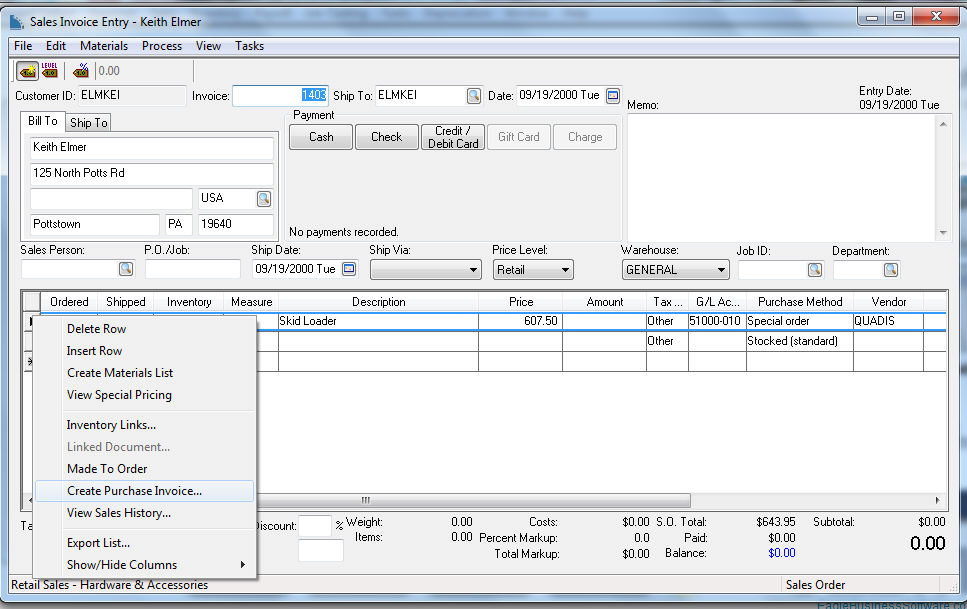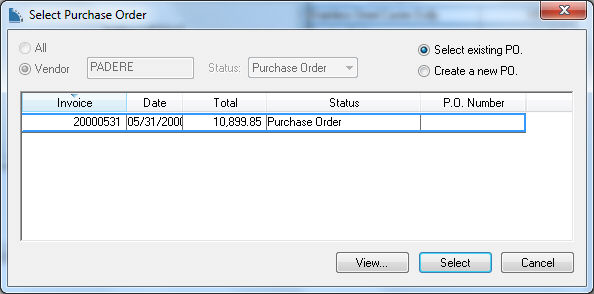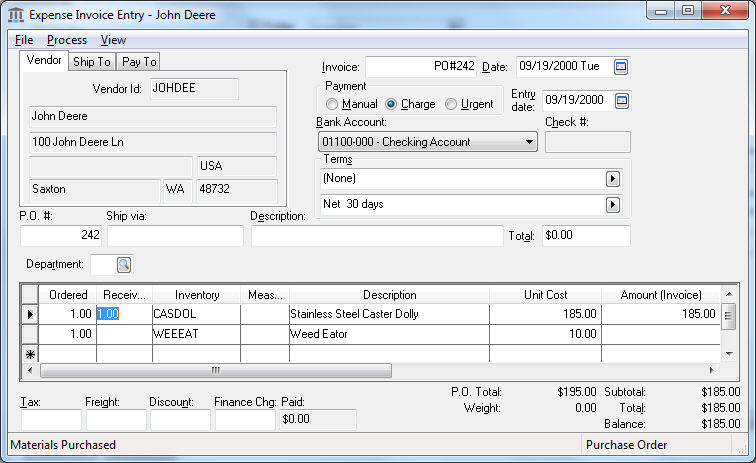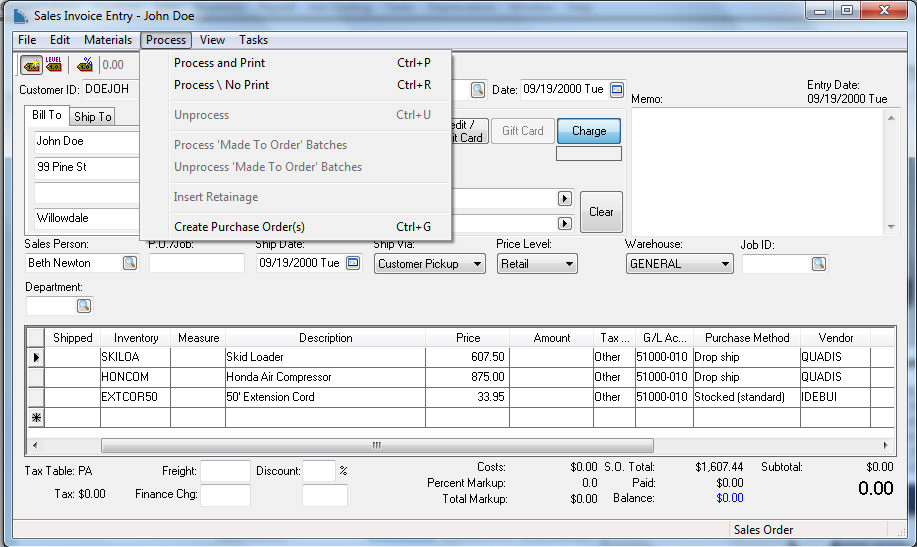Purchasing Special Orders
Special order items and items identified as Drop Ship within the sales order must be "purchased" before the sales order can be processed. The purchasing step is accomplished by linking the sales order to the purchase order. This step can be done using any of the following steps:
-
Linking the purchase directly from the sales order detail line - This option is useful when a single line item is purchased immediately from the vendor.
-
Purchasing the entire sales order - This purchase option is used extensively for drop ship orders or when most of the sales order lines are purchased immediately from the vendor.
-
Purchasing special order items from the Special Orders tab of the purchasing screen - This popular option allows the user to purchase special order items after the sales order is created an saved. This option should be used when the purchasing staff places the orders for products sold by a separate sales team. Using the Purchasing Page facilitates the ordering of special order items and stocked items from a common interface.
-
Receiving and processing special orders. Review Receiving and Processing Special Orders for steps to process special orders when they arrive from the vendor.
-
Creating a purchase order from MyTime. Review [Labor] MyTime > Adding Products to a Task or Work Order for more details on this method of special order purchasing.
Note that purchase order lines can be created from a sales order without using an inventory item. The quantity, Description, and Vendor Part Number are copied to the purchase order with either of the 4 purchasing options.
Linking special orders and drop shipments to a purchase order should be done at the time the items are ordered from the vendor. Review the instructions below for each of the three linking options:
An internal manufacturing vendor setting should be set as the optional Vendor if the special order product is manufactured intead of purchased. Review Manufacturing > Materials Resource Planning (MRP) > Manufacturing Vendor for setup details.
Linking the purchase directly from the sales order detail line
-
Right click on the detail line to link a purchase order directly to a specific line item of a sales order as shown below:

The Create Purchase Invoice option will only appear if the Purchase method is set to Special Order, Drop Shop, or Replenishment and if a Vendor code is entered. The option will also not be available if the line item has already been linked to a purchase order. The following dialog will not appear if the Purchase method is set as Drop Ship.

-
Select the Create a new PO option if you do not wish to append to an existing purchase order.
-
Click on the Select existing PO and configure the All/ Vendor settings to select an existing purchase order.
-
Click on the Select / Create button to create the purchase order as shown below:

The Ordered quantity, Description, and Vendor Part Number is copied from the sales order to the Received, Description, and Vendor Part Number columns of the purchase order.
The Received quantity of the purchase order is linked to the Shipped quantity of the sales order if the Purchase Method is set as Drop Ship or Sync Quantities. These special order transactions will not affect the inventory On-hand count of the inventory item since these values always match. Use the Associated method if the quantity fields should not be synchronized. Populate the Received quantity when special order items are received from the vendor.
Drop shipments will never be handled by the user since the product is shipped directly from the vendor to the customer. Populate and process both invoices at the time the product has been shipped to the customer and the sales order is processed. The Shipping Customer ID within the Ship To tab of the purchase order will be populated with the Customer ID within the sales order for drop ship purchase orders. Right click on any of the drop ship detail lines of the purchase order and select Linked Document from the context menu to view the associated drop ship sales order.
Purchasing the entire sales order
This purchasing option is the recommended method used for sales orders that contained dropped shipped items especially if the sales order includes multiple items that are shipped on the same purchase order.
-
Open the sales order and select Process > Create Purchase Orders(s) from the sales order menu as shown below:

Review the previous section for details on the wizard to create the purchase order.
Purchasing Special Order Items from the Special Orders Tab of the Purchasing Screen
The Purchasing Page contains a Special Orders tab that lists all the special orders and drop shipments that are not linked to a purchase order.
-
Go to Inventory > Purchasing and click on the Special Orders tab as shown below:

-
Click on the Find (F5) button or hit the F5 keyboard key to list all the special order items the match the query option on the top of the window. All special order items will be listed if all the query options are disabled as shown above. Set any of the following query options to limit the special order list:
-
Enable the Vendor option to list only the special orders that are set to be purchased from the selected Vendor.
-
Enable the Folder and the Include Subfolders options to limit the list to special order items from a specific folder group or subfolders. Review the Product Catalog > Adding and Deleting Inventory Folders section for more details on inventory item folders.
-
Enable the Manufacturer option to list only items associated by a single manufacturer. The Manufacturer setting is found within the General tab of the inventory item.
-
Enable the Purchase Method option and select a specific method to limit the special order lists to one of the Purchase Method settings - Drop ship, Replenishment, Sync Quantities and Associated. Review the Purchasing > Purchasing Methods section for more details on these options.
Note that the Find (F5) button must be clicked to refresh the list of items.
-
Enable the Ship Dates query to remove any orders that are beyond the ___ days before the specified date. Disable this option to list ALL orders. Enable this option to remove special orders that are scheduled in the future using the Ship Date within the sales order.
-
Enable Include vendor lead times to add the vendor lead days to the equation: Include all orders that have an order Ship Date < (specified date - days - lead days of selected vendor). Review [Inventory] Purchasing > Estimated Time of Arrival (ETA) Date for details on lead days. Some documents use a transfer date when the Ship Date is not included in the document.
-
Enable the Selected option (first column of item list) for each item you wish to place on the purchase order. Click on the Create P.O. button to link Selected special orders to a purchase order.
The special order list can be evaluated when the Create PO is launched from the main Inventory Purchasing Page by enabling the View when creating purchase order option within the Inventory > Options > General tab. Review the Purchasing > Using the Purchasing Page to Create Purchase Orders for details on this option.
Receiving and Processing Special Orders
Review Receiving and Processing Special orders for steps to process the receiving of special orders from the vendor.
Projecting Purchases and Manufacturing needs of Special Orders
Review Manufacturing > Materials Resource Planning > MRP Overview for information on how EBMS creates manufacturing batches and purchasing for the MRP process.




